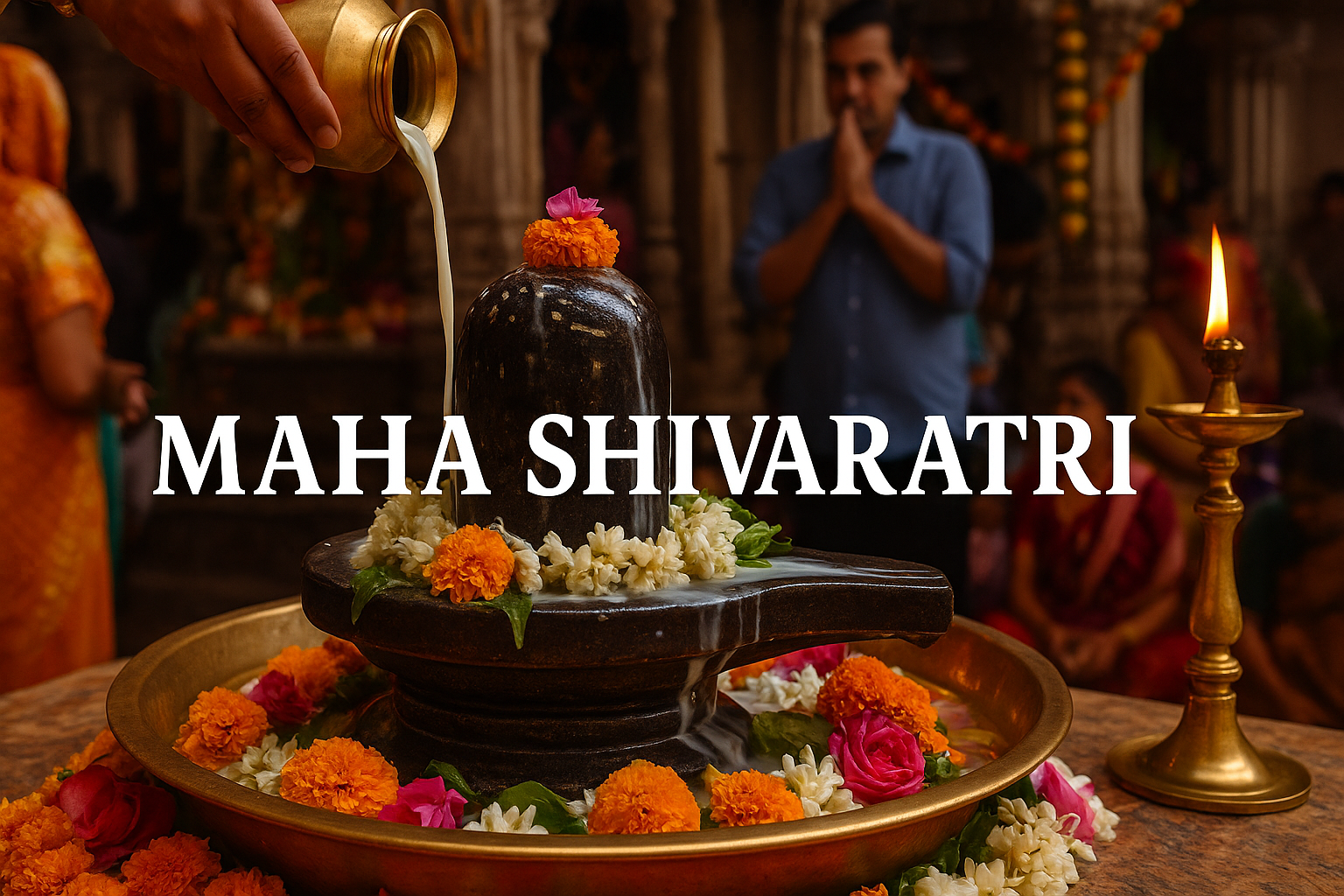Maha Shivaratri, literally meaning "The Great Night of Shiva," is one of the most powerful and sacred festivals celebrated across India and beyond. It holds immense significance for devotees of Lord Shiva, the destroyer and transformer among the Holy Trinity (Trimurti) in Hinduism. 🙏 Celebrated annually on the 14th night of the dark fortnight of the month of Phalguna (February–March), Maha Shivaratri is a symbol of overcoming darkness and ignorance.
This festival is not just about rituals and fasting; it represents spiritual awakening, self-reflection, and connection with the divine.👉 It is also counted among the Ancient Festivals of India (Read more), dating back thousands of years to the Vedic period.
📜 The Mythological Significance of Maha Shivaratri
There are several fascinating stories associated with Maha Shivaratri:
Marriage of Shiva and Parvati: According to legends, this auspicious day marks the divine union of Lord Shiva and Goddess Parvati. Devotees celebrate their eternal love and harmony.
Samudra Manthan: During the churning of the cosmic ocean, deadly poison (Halahala) emerged, threatening to destroy the universe. Lord Shiva drank the poison to save creation, and Maha Shivaratri honors this supreme sacrifice.
Shiva's Cosmic Dance (Tandava): It is also believed that Lord Shiva performed the sacred dance of creation, preservation, and destruction — the Tandava — on this night.
Each of these tales underscores Shiva's role as the protector of the universe. 🌌
🌙 Rituals and Traditions Observed During Maha Shivaratri
Maha Shivaratri is observed with deep devotion, fasting, and night-long vigils. Here's how people celebrate:
1. Fasting (Vrat) 🍽️
Devotees observe a strict fast, some without even drinking water (nirjala vrat). It symbolizes self-control and devotion.
2. Night-Long Vigil (Jaagaran) 🕯️
People stay awake all night, chanting "Om Namah Shivaya," singing bhajans, and reading Shiva Puranas.
3. Shiva Abhishekam 🥥🌸
Devotees perform sacred offerings to Shivalinga with milk, water, honey, ghee, curd, and bilva leaves, each carrying a special significance.
4. Visiting Shiva Temples 🛕
Pilgrims throng to famous Shiva temples such as Kashi Vishwanath, Somnath, and Kedarnath. Temples resonate with the sound of bells and chants.
✨ Spiritual Significance of Maha Shivaratri
Maha Shivaratri is more than a religious event; it is a profound spiritual opportunity.
Overcoming Ignorance: Fasting, prayers, and meditation help in conquering inner darkness.
Spiritual Awakening: The planetary positions are believed to create a powerful spiritual atmosphere.
Self-Realization: The night of Maha Shivaratri is ideal for self-inquiry, reflection, and awakening to higher consciousness.
For many, Maha Shivaratri is the doorway to ultimate liberation (moksha) 🌸.
📚 Maha Shivaratri Across India: Regional Variations
Though the essence remains the same, Maha Shivaratri is celebrated in diverse ways across India:
Kashmir: Celebrated as Herath, a unique festival where walnuts are used in rituals.
South India: Devotees perform elaborate night-long pujas in temples like Annamalaiyar Temple in Tamil Nadu.
Madhya Pradesh: The grand Shivaratri Mela in Khajuraho attracts thousands of devotees.
Assam: Shiva temples like Umananda see massive crowds, with cultural programs and fairs.
📖 How Maha Shivaratri Is Mentioned in Ancient Scriptures
Maha Shivaratri is mentioned in several ancient texts:
Shiva Purana: It describes the significance of Maha Shivaratri fasting and worship.
Skanda Purana: It narrates stories related to Shiva-Parvati and the importance of night-long vigil.
Linga Purana: Emphasizes offering special prayers to the Shivalinga on this night.
These sacred writings underline why Maha Shivaratri holds a special place among Ancient Festivals of India (Explore here).
🙏 Scientific Reasons Behind Maha Shivaratri Practices
Modern science offers some fascinating explanations for traditional practices:
Detoxification: Fasting aids in detoxifying the body and strengthening willpower.
Meditation: Staying awake helps align one’s body with cosmic energy due to planetary positions.
Mental Focus: Chanting mantras and meditation boost brain functioning and emotional stability.
This blend of spirituality and science makes Maha Shivaratri truly remarkable! 🧘♂️
🎉 How to Celebrate Maha Shivaratri at Home
If you cannot visit temples, you can still observe Maha Shivaratri meaningfully at home:
✅ Start your day early with a bath and wear clean clothes.✅ Set up a sacred altar with a Shivalinga or Shiva image.✅ Perform Abhishekam with water, milk, and honey.✅ Offer bilva leaves, fruits, and flowers.✅ Chant "Om Namah Shivaya" 108 times or more.✅ Read stories from the Shiva Purana.✅ Light an oil lamp and stay awake, meditating on Lord Shiva.
🕉️ Maha Shivaratri and the Importance of Family Celebrations
Maha Shivaratri is also a beautiful time to bond with family members through shared prayer, storytelling, and devotion.Similar to how Raksha Bandhan strengthens the bond between siblings (Know more), Maha Shivaratri can strengthen the bond between families by fostering shared spiritual practices.
🛕 Famous Shiva Temples to Visit During Maha Shivaratri
If you plan a pilgrimage, some temples offer an extraordinary experience during Maha Shivaratri:
Kashi Vishwanath Temple (Varanasi)
Mahakaleshwar Jyotirlinga (Ujjain)
Brihadeeswarar Temple (Tamil Nadu)
Kedarnath Temple (Uttarakhand)
Each temple holds immense historical, cultural, and spiritual significance. 🌄
✨ Maha Shivaratri and Its Global Celebration
Today, Maha Shivaratri is celebrated by Hindu communities around the world, including in the United States, United Kingdom, Canada, Australia, and Mauritius. Temples across the globe organize special night-long events, symbolizing the universality of Shiva’s wisdom and compassion.
🌟 Conclusion: Maha Shivaratri – A Journey Within
Maha Shivaratri is not just a festival; it is a journey — from darkness to light, from ignorance to knowledge, from material to spiritual. 🌼 It invites everyone to seek the truth, experience divinity, and evolve spiritually.
Let this Maha Shivaratri be your inner awakening. Chant, pray, meditate, and offer your love to Lord Shiva. May you be blessed with peace, prosperity, and ultimate liberation. 🙌🛕

